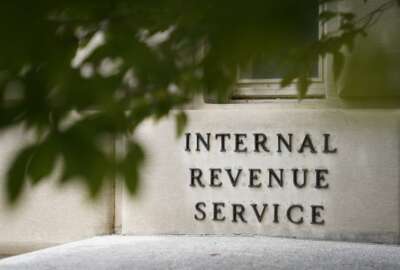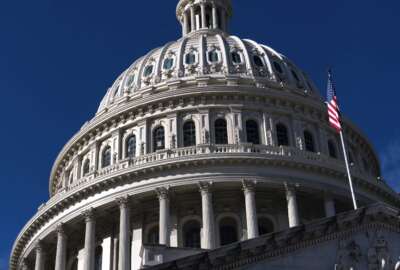Congress gets options on how to improve oversight of something nearly every agency does
Rulemaking. The government does lots and lots of it. But because the power to regulate is the power to destroy, rulemaking has rules. And like all agency...
Rulemaking. The government does lots and lots of it. But because the power to regulate is the power to destroy, rulemaking has rules. And like all agency activities, it requires congressional oversight. The Select Committee on the Modernization of Congress asked the Government Accountability Office for ideas on how to improve rulemaking oversight. To find out what the committee came up with, the Federal Drive with Tom Temin spoke with Yvonne Jones, GAO’s director of strategic issues.
Interview Transcript:
Tom Temin I’m accurate in saying that what they asked is not for you to look at rulemaking, but to look at oversight of rulemaking.
Yvonne Jones That’s correct.
Tom Temin All right. And what prompted this? This committee was looking at a lot of areas of congressional operation.
Yvonne Jones That’s correct. But the committee was looking at ways to strengthen the legislative branch, including its responsibility to pass and oversee laws. So the committee asked GAO to identify how increased legal and regulatory resources could strengthen the legislative branch. That’s how we got this request from them.
Tom Temin So legal and regulatory, those are related, but not really the same thing.
Yvonne Jones That’s correct. The regulatory relates to, of course, all the rules that are passed in order to implement the laws that the legislature passes. Legal, of course, relates to statutes and other kinds of authorities which are passed by the Congress. So they are often, shall I say, complimentary, but they are clearly not the same.
Tom Temin Sure. And so what was the concern of the committee that Congress just doesn’t have enough visibility into agency rulemaking? Because this was a bipartisan committee. So it wasn’t a matter of saying a particular rule we disagree with or agree with, but more what? Trying to just get understanding what’s going on in the agencies.
Yvonne Jones Well, there was that. But I think overall, the committee mentioned that they were concerned that the Congress was doing less oversight for a number of reasons. Some of it was because the committees have fewer staff, or they have fewer staff with a deep understanding of the policy issues, their budgets for committees have been cut. And I think that it would be fair to say that they thought that in terms of a balance of oversight or affecting regulations between the Congress and the executive branch, that the executive branch perhaps has more power or more influence now than it had years ago.
Tom Temin Yeah, that’s an important observation, that congressional staff is really the body of knowledge that is standing in Congress. And I think people misunderstand that. Sometimes they think each member of Congress is an expert in all of these areas. And they’re politicians and they a lot of them do know a lot about these things. But there’s a lot of knowledge embodied in staff that tends to be a little bit more stable when the members come and go. So what then, did you come up with as ways, perhaps to help Congress so that it understands what’s going on and can oversee rulemaking?
Yvonne Jones Well, what we understood was from the members of the committee staffs, that they wanted us to look at options for potentially increasing Congress’s role and to both oversight and legal issues concerning policies and programs. And they mentioned that they would like us to look into options and trade offs in potentially creating two new offices, an Office of Regulatory Review and an Office of Legal Counsel. So that’s what we did. We reviewed literature and we talked to experts and developed a list of considerations that the Congress could take into account. We did offer a number of options on how these offices might be created, structured how they might operate.
Tom Temin All right. We’re speaking with Yvonne Jones. She’s director of strategic issues at the Government Accountability Office. And let’s talk about that first one, the Office of Regulatory Affairs. There is a similar office in the White House, Office of Information and Regulatory Affairs, OIRA, which reviews major rules that come from agencies. So was the recommendation that Congress have something similar, a body almost like a mini GAO, focused on rules that are major, at least coming out of the agencies.
Yvonne Jones Ok, so this is perhaps a subtlety, but we did not make recommendations. We offered options and trade offs, because it is our view that when you’re looking at the structure of Congress, it is Congress itself that determines its structure and how it is going to be governed. But we did say that one thing that Congress could do is to create new offices. And we did compare a potential Office of Regulatory Review with OIRA. We did not say that the new office should replace OIRA, but we did, for example, talk about considerations, which is how many staff and office would have what the budget would be. We offered a comparison between the staff and budget of OIRA. And we did talk about considerations like duplication and overlap in this particular situation. If Congress chose to create the office, that could happen. We also talked about the cost of creating new offices.
Tom Temin Right. Good point. Options for them to consider, but not recommendations. And dueling OIRA’s, I guess, could be seen as duplication in one sense. But on the other hand, if you have a majority of one party in Congress and a different party in the White House, and that’s happened from time to time, then you would have checks and balances OIRA, rather than competing OIRA. Could be an option.
Yvonne Jones That’s correct.
Tom Temin And on the legal counsel side, what do you envision such an option could do there because Congress writes the laws.
Yvonne Jones And so we talked about there to that. For example, you could create a new Office of Legal Counsel that might perhaps represent both chambers, or you might create an office for each chamber, or you might modify, for example, existing offices like Congressional Budget Office or the Research Office of the Congressional Review Service. But there are times when the Congress feels that it needs to have its view of the law represented, like, for example, in court proceedings. So, for example, an Office of Legal Counsel could present its view. It could, in fact defend the Congress, a committee, committee chairs or ranking members or committee members, if need be. It could play the role of the advocate of Congress, for example, before the Supreme Court or other levels of the court. So there are any number of things that that kind of an office could do to help the Congress make sure that its view of appropriate legal actions is presented.
Tom Temin Right. Because sometimes the courts simply take the plain language of a law, and because people and human beings write laws, sometimes the language is not necessarily consonant with the intent. And this comes up a lot in many cases. So could this Office of Legal Counsel or whatever it ends up being called, should Congress do it? Maybe somehow express in prose what the intent was, as opposed to what the language might have been in court proceedings?
Yvonne Jones Well, I’m not a lawyer. Conceptually speaking, I think that is one of many things that such an office could potentially do.
Tom Temin All right. And now the committee itself disbanded. And now there’s different elements of Congress that are looking at modernization, hopefully taking up some of its recommendations. So the report where does it go now? Who’s looking at it? What have you heard, if anything, from members?
Yvonne Jones Ok. Well, we have briefed members of Congress and we have other briefings scheduled. But what would happen now is that Congress would deliberate on the options that we indicated. So, for example, we’ve talked a bit about the creation of a new office. But for example, we options included revising existing processes like adding expiration dates or sunset dates, like for rules. And then a third option we had was to alter oversight functions, such as adding requirements for agencies to conduct their review. So the Congress will review the options that we have offered. In the meantime, while Congress decides what it wants to do, our report has been issued and we include it with the report, an Excel table, which includes all of the options for an Office of Regulatory Review. So a person could isolate options, sort them in a number of different ways, and look at other issues like duplication, cost overlap. We also, not in an Excel table, but in the report, we presented a number of potential options for the creation of an Office of Legal Counsel. So this information is available to everyone, to the public as well as to the Congress.
Tom Temin Sort of like congressional Tetris, it seems like you’ve given them the shift and move those cells around.
Yvonne Jones Well, we hope that it won’t take as long for people to understand it and master it. But yes, if you wish.
Tom Temin And by the way, was one of the options, perhaps, that GAO could take on some of these functions. I mean, GAO does something that seems unrelated to the core mission, which is hearing and deciding on contract protests. GAO does that. Could GAO be the OIRA location? Was that one of the options?
Yvonne Jones Well, we were not that specific. We did mention that there were perhaps functions that GAO could take on. But as I said earlier, not wishing to make a recommendation, we talked more conceptually about what offices could do and then what the considerations would be in terms of trade offs.
Copyright © 2025 Federal News Network. All rights reserved. This website is not intended for users located within the European Economic Area.
Tom Temin is host of the Federal Drive and has been providing insight on federal technology and management issues for more than 30 years.
Follow @tteminWFED






